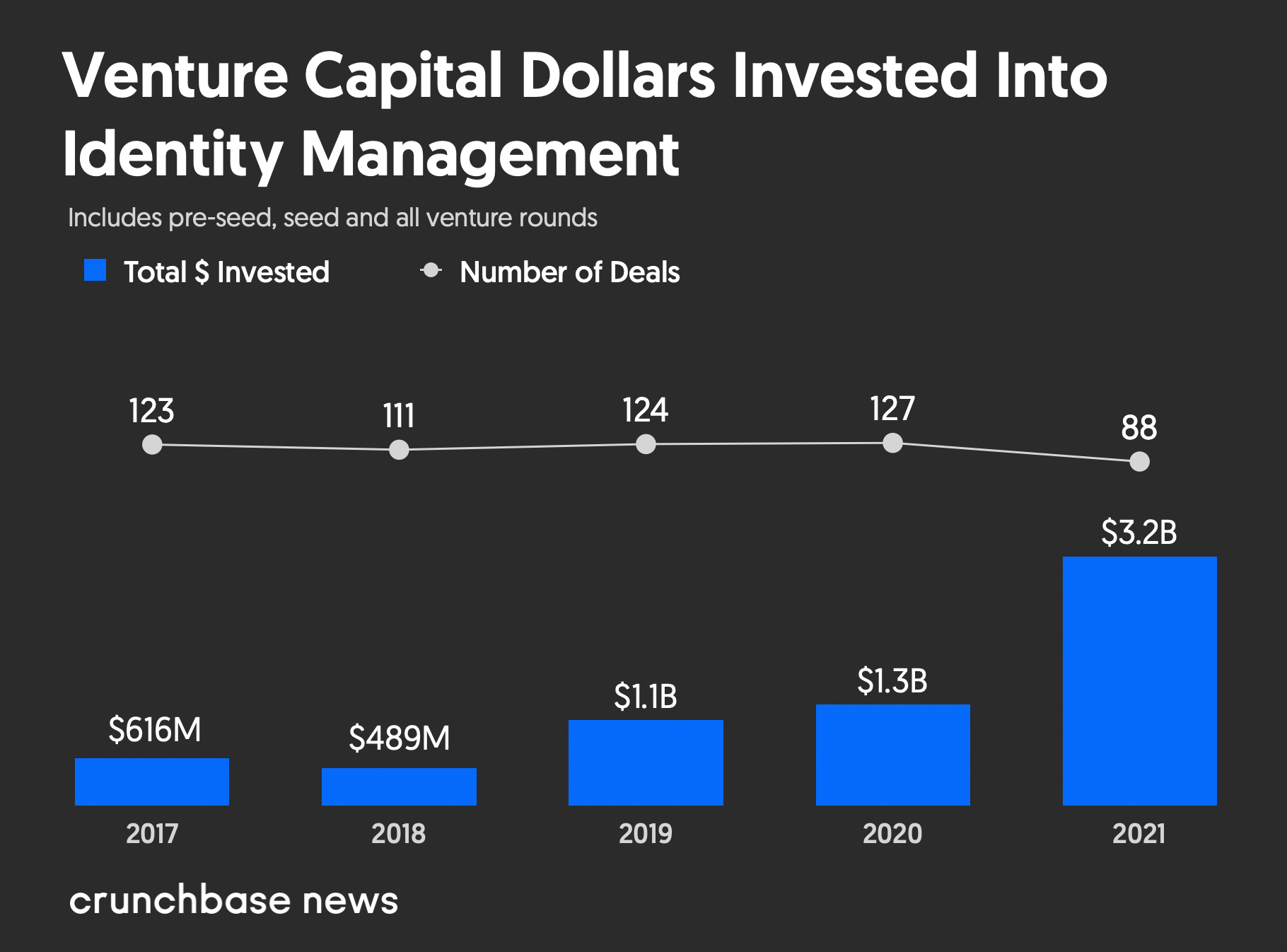Identifying customers and employees on a network has always been a difficult thing for companies, often relying on outdated, vulnerable passwords that can be bought and sold on the dark web.
Subscribe to the Crunchbase Daily
Figuring out better ways to ID and authenticate people is something security experts have been working on for decades—and while new methods are seeing slow adoption, they are realizing large dollar investment from venture capitalists.
This year has already seen $3.2 billion in venture dollars go into the identity management space—about 2.5x the amount of investment from last year’s $1.3 billion, which was already a record.

Just today, San Francisco-based real-life verification company Incode Technologies announced a $220 million Series B funding round, giving the company a $1.25 billion valuation—and that is far from the only large round and valuation this year. Some others according to Crunchbase data include:
- Israel-based passwordless authentication company Transmit Security hit a pre-money valuation of $2.3 billion after raising a $543 million Series A in June.
- Last month, New York-based digital identity verification firm Socure closed a $450 million round at a $4.5 billion valuation as more companies go digital and fraud escalates.
- In June, Vancouver-based Trulioo closed a $394 million Series D.
In addition to those financing deals, the space also saw one of the largest M&A deals in all of security this year when Okta paid $6.5 billion in stock for Bellevue, Washington-based Auth0 back in March.
“You are just seeing true focus on the identity piece,” said Steve Ward, a former CISO and now managing director at Insight Partners, which co-led Transmit’s Series A along with General Atlantic. “I’m really bullish on getting away from tech that came out in the 1960s, and that’s passwords.”
Managing ID during COVID
Identification and authentication had been popular in cybersecurity for years, with companies like Okta, Ping Identity and ForgeRock all developing platforms to help IT departments at companies manage employee identities. The COVID pandemic has continued to push growth at several of these providers as companies must manage a hybrid workforce in which many employees work from home, and authentication has become harder with that more dispersed workforce.
In addition, the pandemic also has helped bolster the market for platforms that manage consumers through biometrics, document verification, passwordless tech and other means as people move more of their lives online and fraud continues to explode.
“Real life identity has gotten real traction in recent years,” said Ricardo Amper, founder and CEO of Incode.
Martín Escobari, co-president, managing director and head of Latin America at General Atlantic, said his recent investment in Incode was an obvious decision with the biometrics and authentication market estimated by some to be a $12 billion opportunity in the U.S. and Latin America—and the market is still nascent.
“We expect it to significantly expand in the near term as enterprises further focus on fraud reduction, access to credit expands, and we see the continued proliferation of financial products,” Escobari said.
“Combined with the rapid acceleration of digital technology adoption during the pandemic, which has driven higher remote account openings and transaction volumes, the identity access management space has become even more critical,” he added.
With talk about things such as the metaverse and “portable identity”—a users’ ability to take their identity with them to all places, including the data and relationships built through other digital platforms starting to take off, it seems likely more investors will identify ID management as a space to be in.
Illustration: Dom Guzman

Stay up to date with recent funding rounds, acquisitions, and more with the Crunchbase Daily.





![Illustration of a guy watering plants with a blocked hose - Global [Dom Guzman]](https://news.crunchbase.com/wp-content/uploads/quarterly-global-3-300x168.jpg)
67.1K Followers